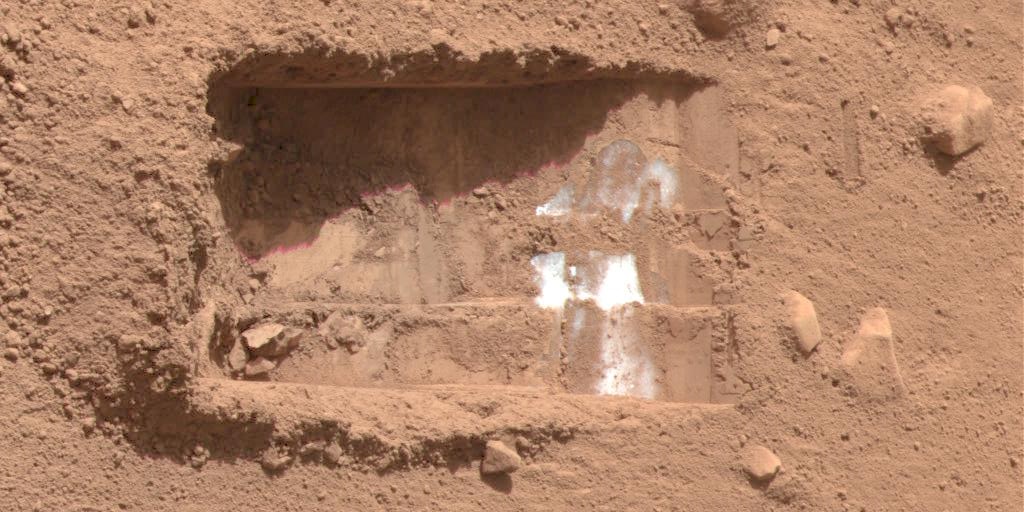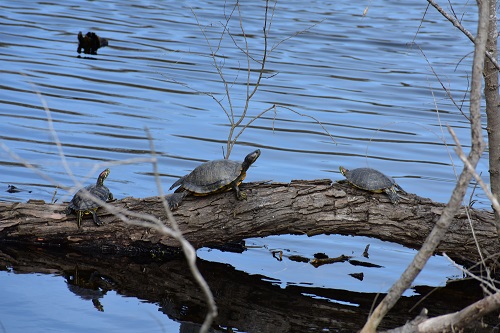Special Feature: “I Love You to Mars” by Chloe N. Clark
9 Minutes Read Time

Managing Editor Lisa Ampleman: I say without shame that I am a space nerd (or space hipster, as one Facebook group calls it), so when I first read Chloe N. Clark’s story “I Love You to Mars,” I loved the grittiness (literally) of the descriptions (have you heard, by the way, that the dust on Mars might be toxic?). I’m also fascinated by the narrative technique, as the protagonist, Pedro, experiences things from several different time periods at once. That simultaneity, Pedro’s relationships with his wife and best friend, and the tragedies underlying his state of mind create a stark yet fully drawn picture. Because this story is longer than our miCRo series’ limits but shorter than what we tend to publish in the magazine, we’re glad to present it here on our site as a special feature.
To hear Chloe read the story, click below:
I Love You to Mars
The dust of Mars gets into everything, edging itself into the folds of the suit, the treads in boots, the weld lines between helmet and visor. Pedro remembers it in his dreams. The good ones, even if they include how irritating the dust sounded skittering across visor glass. In nightmares he doesn’t remember Mars at all; in nightmares he is lost in places familiar. His childhood home, the offices at the space center, his own home. He leaves his keys, the doors all lock from the inside out. Everything is bigger than he remembers, he reaches for doorknobs, and he is the size of a toddler. And in the corners of every room, an absence. Not darkness, not shadow, but something that should be there and isn’t. The rooms uncoalescing from their parts. He tries not to look at the corners while asleep. He starts to avoid them when awake too, to be careful.
Where are the corners on an empty planet.
*
In the courthouse Raye’s arm is hooked through his. He’s in jeans and a T-shirt that advertises The Space Bar. She’s in a sundress decorated in tiny frogs meant to look like flowers. Raye leans closer, whispers in his ear, “We put on our Sunday best.”
His best friend, Ten (short for the ridiculous name of Tennyson his parents felt fit to bestow upon a baby), is their witness, and he’s late as always. When he races in, he shrugs but doesn’t apologize.
“Shouldn’t astronauts be punctual?” Raye says.
“Do you know how many launches get delayed?” he replies.
They roll their eyes at each other, smiling. Pedro feels the pressure between his shoulder blades relax. Nothing will go wrong. Everything’s okay.
The doors open, and they are ushered in. He slips his fingers between Raye’s.
She turns to him. “Love you to Mars and back.”
“To Mars and back.”
I do. I do.
In the corner of the courthouse, his mother and father. How can they be here? They weren’t. They aren’t. An absence. Pedro blinks.
*
Technically, Deena’s feet hit the Martian surface first, so she is the first person on Mars. But the news sites still plaster Pedro’s face across their banners: First Man on Mars.
“Are you kidding me?” Deena says.
“They like alliteration. And also misogyny,” Pedro says.
But before that, there is the sound of wind and nothing. No cars, no hum and thrum of life, as they walk out onto the surface. The dust rising up to coat their legs, their boots. The scritch-scritch of it across the glass of their visors. They don’t make a sound, staring out across the planet.
It could go on forever and forever.
Pedro crouches slowly, the suit restricting his fluidity of movement, touches the ground, lifts the dust and lets it filter through his fingertips.
As it pours back down, each particle spins, twirls. Snowflakes, dust, ashes. The shadows are pulling in, flooding the corners of his vision. He turns, there are no edges here, no place for the world to pool and crash itself away from him.
A flower floats from the dust onto the ground. It shakes its petals. Hops away. Dust. Corners. An absence. To Mars.
*
Ten is supposed to be the first man on Mars. It’s written in the stars, he says dramatically when the candidates are at The Space Bar. He’s got a beer in one hand; the other he waves at the ceiling where everyone’s name has been added to a star. A tradition going back to the first moon mission. But Ten’s is the biggest star of this group of candidates. Everyone laughs, secretly wondering if it’s true. If the bar somehow knows more about how it will fall out than they do.
“My king,” Pedro says, laughing. He wants it to be his friend, even more than he wants it to be himself. He has never wanted to be the first at anything, to have the flash of cameras, the wiki page, the weight of saying something profound as you step out on all that untouched ground. Pedro will settle for second crew, third crew, anyone who gets to go but doesn’t have to give eight thousand talks when they get back. Raye jokes that he’s the reluctant Martian.
When Ten is selected, later, everyone raises a glass. They look at the stars on the ceiling of the bar, trying to determine which are the next biggest in size.
Pedro’s awake when Ten’s mission ends. He’s doomscrolling, and someone texts him, then another person, then another, then a phone ringing.
He wonders how much they felt. Then he tries to stop wondering. He pictures Ten in their first training class together, Ten in the bar, Ten at his wedding coming in late.
In the bar Ten turns, glass still raised in one hand. He whispers “Do you see it now?” and points to the corners of the room, to the absence curling outward toward them both. Pedro takes a step back, almost stumbles.
“Whoa, dude,” someone says as he jostles them. “Handle your drink better!”
On Mars, the dust rises, scratches his visor. Where were the pieces of the ship, had the wind buried them so quickly, covered them into the planet. Ten is standing in front of him, arm raised in a wave. “You’re late.”
*
Raye hands him his keys. He asks where they were this time, and she frowns. “The fridge.”
In his dreams he gets lost so frequently he’s not sure it counts as a nightmare anymore. It’s all just dreams. The doors he can’t open, the sand filling up against windows. The maps he can’t read.
The doctors say “Sorry.” The doctors say nothing. Pedro opens his eyes inside the tube of the scan and sees the stars above him.
To Mars and back. I love you, Raye says. But she’s walking backward, out of the room, out of the courthouse, out of his mind until she’s just a faraway pinprick of light against the dark.
On Mars it’s easy to get lost. He’s never been here before. He’s been here before so many times. The bar. The courthouse. His childhood home. The training rooms, climbing through mock-ups. He’s home. He’s on Mars. He’s reaching out.
“You’re late.”
“You. Mars. Back.”
*
Pedro wakes up from a nightmare where he can’t get out of a room. It’s so small, and he’s even smaller. Raye is beside him. The room is dark. The corners, darker.
Feet on the ground. Dust rises. It scratches the surface of his visor, skittering. No one’s here but Pedro. The bar is empty. The courthouse empty. His bedroom empty. No one’s here but him.
He sits down on the surface of the planet. Pulls up a handful of dust, lets it pour through his fingers. It feels like it lingers on his hand still. He looks up.
On Mars, looking up at the night sky, the Earth seems like just a particularly bright star. A little extra bit of light. So bright he could reach out and touch it, could hold onto it if he tried. It says Back. And Back. Getting louder and louder. Back. Come back.
Writer’s Statement:
Over the past year I’ve been working on a novel about the space race—from the original moon landing through to a future Mars colony. As I was writing, I kept circling back to certain characters, and Pedro is one. Being the first man on Mars felt like a heavy weight to bear for many reasons. Additionally, I wondered what long-distance space travel might do to one’s body. I’ve been interested for a while in what we are willing to put people through in the name of science or of our country—everyone from astronauts to soldiers bear this burden, and it’s one we as a culture need to examine. After writing this story, I saw a recent study that linked space travel with increased risks of brain damage and dementia for astronauts, making it much more prophetic than I would have liked.
Chloe N. Clark is the author of Collective Gravities (Word West, 2020), Patterns of Orbit (Baobab, 2023), and more. Her story collection Every Galaxy Is a Circle is forthcoming from JackLeg Press.

